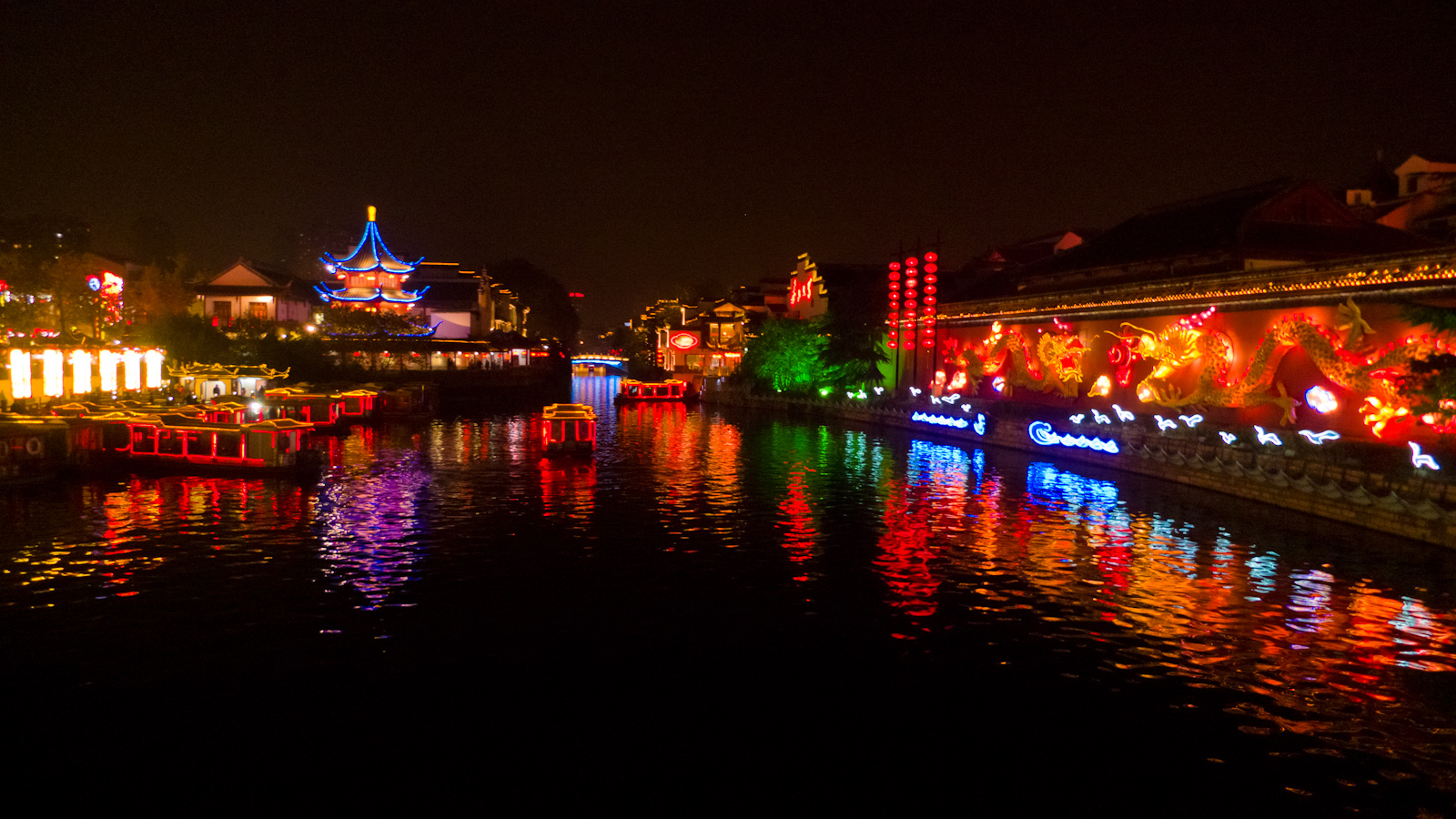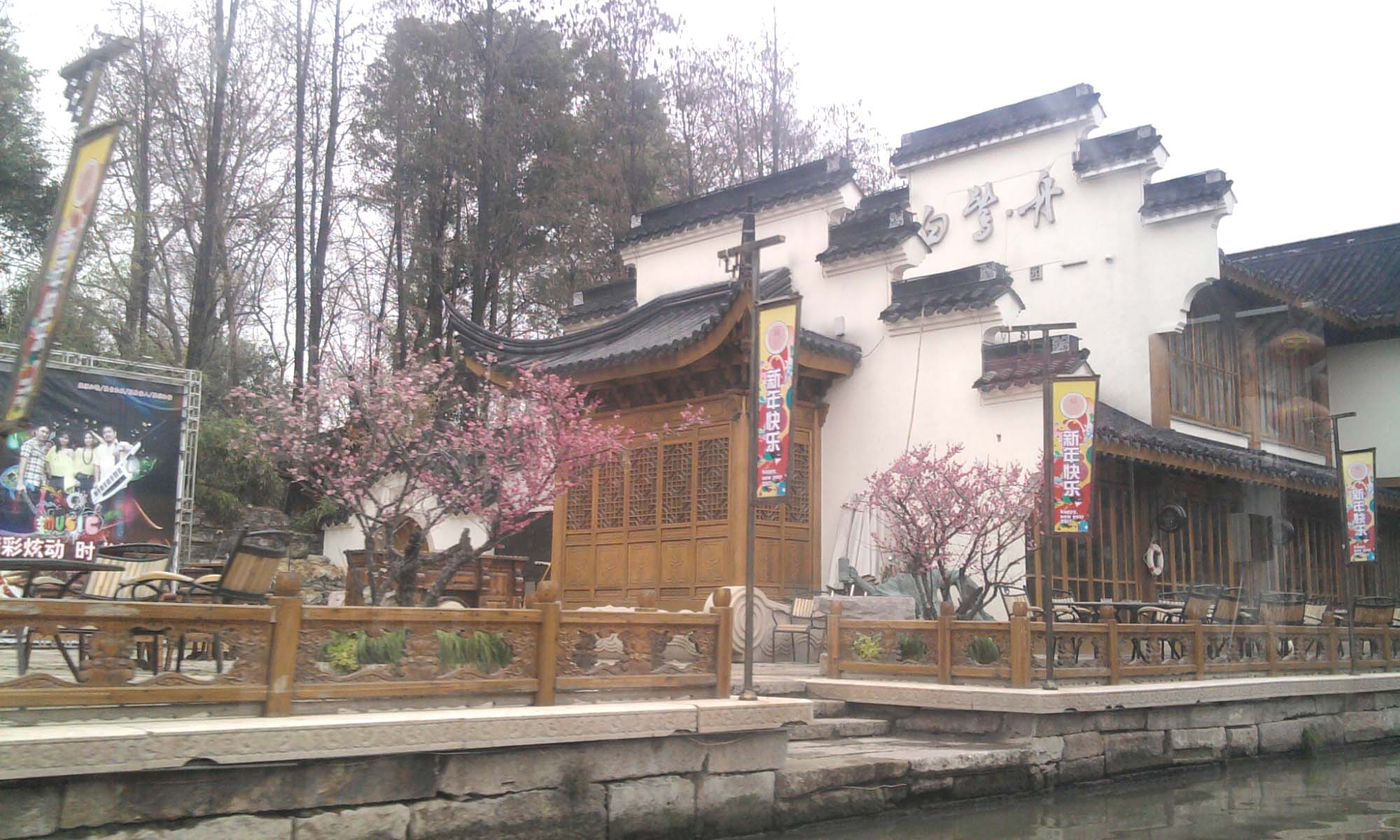Qinhuai River on:
[Wikipedia]
[Google]
[Amazon]
The Qinhuai River () is a tributary of the

 The Qinhuai River used to be called Huai Water and was renamed Qinhuai to the legend that Qin Emperor Shihuang, the first emperor of the Qin dynasty (221–206 BC), ordered to introduce Huai Water to the city by excavating a mountain. It is a branch of the Yangtze River, running about 110 kilometres, a major watercourse around Nanjing City, Jiangsu Province. It was very famous in history but lost its fame due to wars, which destroyed many buildings along both banks. The water became filthy and no sign of wealth could be found anymore. After repair and restoration in 1985, the river became a beautiful resort. In Chinese ancient times, places around the Qinhuai River and the Confucian Temple were already very prosperous. The banks along the Qinhuai River were the gathering place for noble and wealthy families and were also frequently visited by scholars. Those places lost glory once in the Sui dynasty (581–618) and the Tang dynasty (618–907), but regained popularity in the Ming dynasty (1368–1644) and Qing dynasty (1644–1911).
The Qinhuai is a branch of the mighty
The Qinhuai River used to be called Huai Water and was renamed Qinhuai to the legend that Qin Emperor Shihuang, the first emperor of the Qin dynasty (221–206 BC), ordered to introduce Huai Water to the city by excavating a mountain. It is a branch of the Yangtze River, running about 110 kilometres, a major watercourse around Nanjing City, Jiangsu Province. It was very famous in history but lost its fame due to wars, which destroyed many buildings along both banks. The water became filthy and no sign of wealth could be found anymore. After repair and restoration in 1985, the river became a beautiful resort. In Chinese ancient times, places around the Qinhuai River and the Confucian Temple were already very prosperous. The banks along the Qinhuai River were the gathering place for noble and wealthy families and were also frequently visited by scholars. Those places lost glory once in the Sui dynasty (581–618) and the Tang dynasty (618–907), but regained popularity in the Ming dynasty (1368–1644) and Qing dynasty (1644–1911).
The Qinhuai is a branch of the mighty
Yangtze
The Yangtze or Yangzi ( or ; ) is the longest river in Asia, the third-longest in the world, and the longest in the world to flow entirely within one country. It rises at Jari Hill in the Tanggula Mountains (Tibetan Plateau) and flows ...
with a total length of 110 km. It flows through central Nanjing
Nanjing (; , Mandarin pronunciation: ), alternately romanized as Nanking, is the capital of Jiangsu province of the People's Republic of China. It is a sub-provincial city, a megacity, and the second largest city in the East China region. T ...
and is called "Nanjing's mother river". It is the "life blood" of the city. The Qinhuai River is divided into inner and outer rivers.
The scenic belt along the Qinhuai River meets with the Confucius Temple at the center and the river serving as a bond. The belt, featuring attractions such as Zhanyuan Garden, the Confucius Temple, Egret Islet, China Gate as well as the sailing boats in the river and pavilions and towers on the riverbanks, is a blend of historic sites, gardens, barges, streets, pavilions, towers, folk culture and customs.
History

 The Qinhuai River used to be called Huai Water and was renamed Qinhuai to the legend that Qin Emperor Shihuang, the first emperor of the Qin dynasty (221–206 BC), ordered to introduce Huai Water to the city by excavating a mountain. It is a branch of the Yangtze River, running about 110 kilometres, a major watercourse around Nanjing City, Jiangsu Province. It was very famous in history but lost its fame due to wars, which destroyed many buildings along both banks. The water became filthy and no sign of wealth could be found anymore. After repair and restoration in 1985, the river became a beautiful resort. In Chinese ancient times, places around the Qinhuai River and the Confucian Temple were already very prosperous. The banks along the Qinhuai River were the gathering place for noble and wealthy families and were also frequently visited by scholars. Those places lost glory once in the Sui dynasty (581–618) and the Tang dynasty (618–907), but regained popularity in the Ming dynasty (1368–1644) and Qing dynasty (1644–1911).
The Qinhuai is a branch of the mighty
The Qinhuai River used to be called Huai Water and was renamed Qinhuai to the legend that Qin Emperor Shihuang, the first emperor of the Qin dynasty (221–206 BC), ordered to introduce Huai Water to the city by excavating a mountain. It is a branch of the Yangtze River, running about 110 kilometres, a major watercourse around Nanjing City, Jiangsu Province. It was very famous in history but lost its fame due to wars, which destroyed many buildings along both banks. The water became filthy and no sign of wealth could be found anymore. After repair and restoration in 1985, the river became a beautiful resort. In Chinese ancient times, places around the Qinhuai River and the Confucian Temple were already very prosperous. The banks along the Qinhuai River were the gathering place for noble and wealthy families and were also frequently visited by scholars. Those places lost glory once in the Sui dynasty (581–618) and the Tang dynasty (618–907), but regained popularity in the Ming dynasty (1368–1644) and Qing dynasty (1644–1911).
The Qinhuai is a branch of the mighty Yangtze River
The Yangtze or Yangzi ( or ; ) is the longest list of rivers of Asia, river in Asia, the list of rivers by length, third-longest in the world, and the longest in the world to flow entirely within one country. It rises at Jari Hill in th ...
and has nursed the rich civilization of the region. The inner parts of the river were once the red-light district – famous throughout the nation, during the Ming
The Ming dynasty (), officially the Great Ming, was an Dynasties in Chinese history, imperial dynasty of China, ruling from 1368 to 1644 following the collapse of the Mongol Empire, Mongol-led Yuan dynasty. The Ming dynasty was the last ort ...
dynasty. Painted boats with red lanterns once shuttled to and fro.
The most prominent part of the Qinhuai River Scenic area in history is famous as a residential area of Qin Huai Ba Yan (秦淮八艳; the eight Beauties of Qinhuai), eight famous courtesans
Courtesan, in modern usage, is a euphemism for a "kept" mistress or prostitute, particularly one with wealthy, powerful, or influential clients. The term historically referred to a courtier, a person who attended the court of a monarch or oth ...
during the Ming-Qing transition period. They were recorded in the book ''Banqiao Zaji'' (板桥杂记) by Yu Huai (余怀). They were Gu Hengbo (顾横波), Dong Xiaowan
Dong Xiaowan (1624–1651), also known as Dong Bai, was a Chinese courtesan, poet and writer, also known by her pen name Qinglian.
Dong has been described as the most famous courtesan of her time, known for her beauty and talent in singing, act ...
, Bian Yujing (卞玉京), Li Xiangjun
Li Xiangjun (; 1624–1654) was a courtesan, singer, and musician during the Ming dynasty. Her life was dramatised in the play ''The Peach Blossom Fan''.
Biography
Li is referred to as Li Ji () or Li Xiang () in contemporary sources. To demonst ...
, Kou Baimen (寇白门), Ma Xianglan
Ma Shouzhen (; c. 1548–1604), also known by her courtesy name Ma Xianglan (, meaning "Orchid of the Xiang River") and pen name Yuejiao ("Lunar Beauty"), was a Chinese courtesan and artist born in Nanjing during the late Ming dynasty (1550–1 ...
, Liu Rushi
Liu Rushi (; 1618–1664), also known as Yang Ai (杨爱), Liu Shi (柳是), Liu Yin (柳隐) and Yang Yin (杨隐),Yang Yinlian (杨影怜), Hedong Jun (河东君), was a Chinese ''yiji'' (courtesan), poet, calligrapher, and painter in the late ...
and Chen Yuanyuan
Chen Yuanyuan (1624–1681) was a Chinese courtesan who lived during the late Ming and early Qing dynasties. She was the concubine of Wu Sangui, the Ming dynasty general who surrendered Shanhai Pass to the Manchu-led Qing dynasty, and later reb ...
.
During the Nanjing Massacre
The Nanjing Massacre (, ja, 南京大虐殺, Nankin Daigyakusatsu) or the Rape of Nanjing (formerly romanized as ''Nanking'') was the mass murder of Chinese civilians in Nanjing, the capital of the Republic of China, immediately after the Ba ...
in 1937, the Qinhuai River was reddened with blood, as the river was filled with tens of thousands of bodies.
Many Chinese folk songs about the massacre talk in detail about the river during this time.
Sightseeing
The area is a highly popular destination with both locals and tourists, and many see or buy goods here, or just take in the sights. Many visitors find it a good place to taste the local cuisine. The snack stalls dotted the area, and offer a range of food: (baozi
Baozi (), Pao-tsih or bao, is a type of yeast-leavened filled bun in various Chinese cuisines. There are many variations in fillings ( meat or vegetarian) and preparations, though the buns are most often steamed. They are a variation of ''mant ...
) steamed buns-stuffed with pork, and other delicate fillings, Bawei Dawei Doufunao (eight-flavored jellied bean curd pastries) roasted beef, salty duck, animal stomach, chicken feet (phoenix feet) and much more.
The former residence of famed courtesan Li Xiangjun
Li Xiangjun (; 1624–1654) was a courtesan, singer, and musician during the Ming dynasty. Her life was dramatised in the play ''The Peach Blossom Fan''.
Biography
Li is referred to as Li Ji () or Li Xiang () in contemporary sources. To demonst ...
is located along the Qinhuai River and is open to the public.
References
{{coord, 32, 04, 40, N, 118, 43, 33, E, region:CN-32_type:waterbody_source:kolossus-dewiki, display=title Rivers of Jiangsu